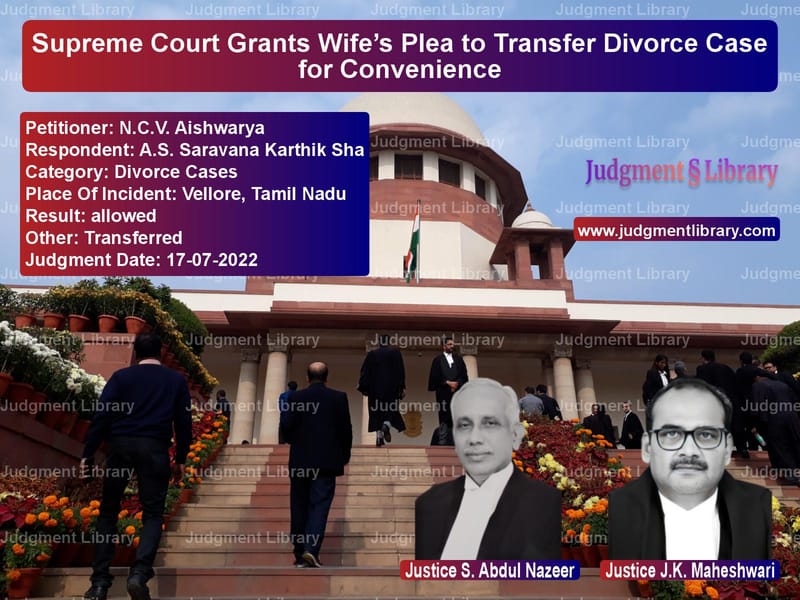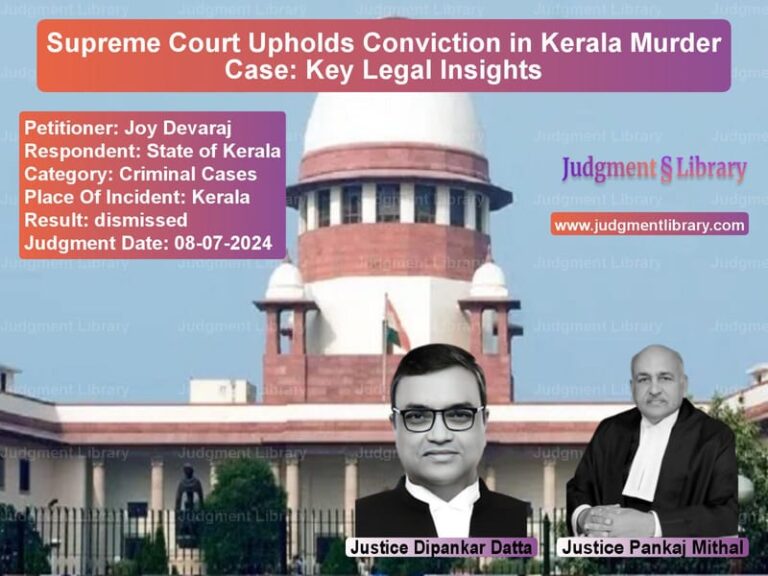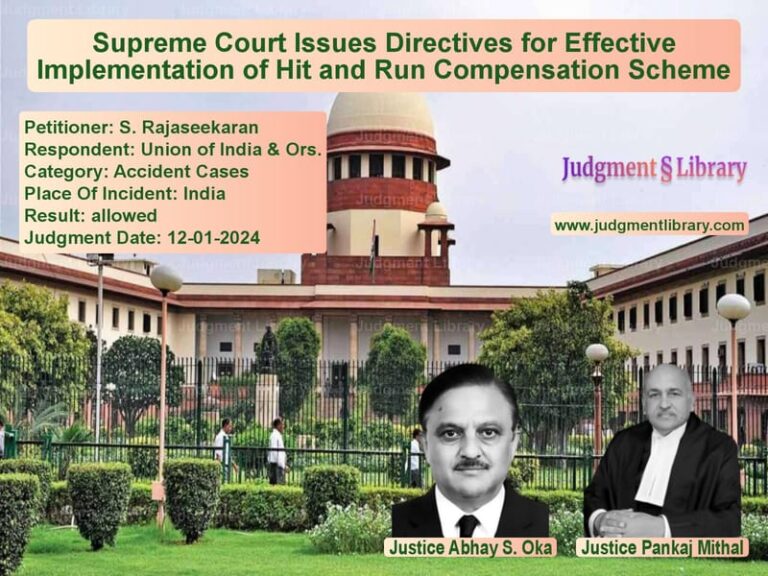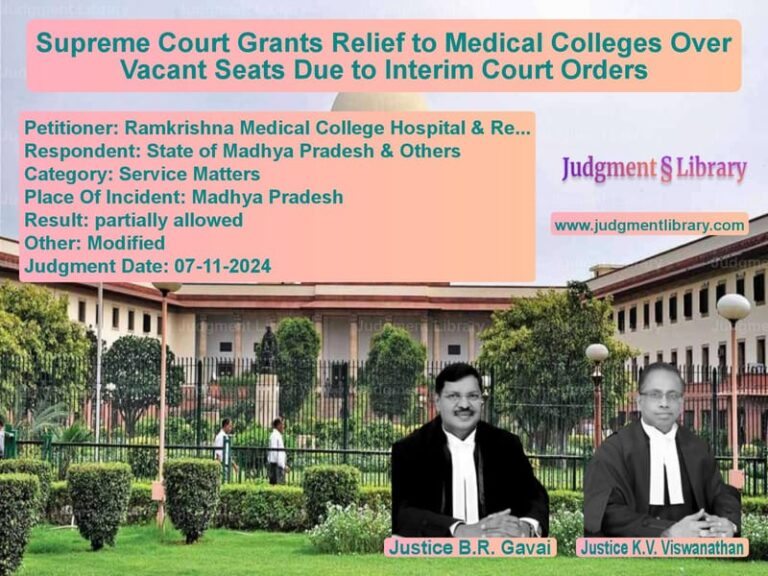Supreme Court Grants Wife’s Plea to Transfer Divorce Case for Convenience
In a landmark ruling, the Supreme Court of India in N.C.V. Aishwarya vs. A.S. Saravana Karthik Sha addressed the crucial issue of transferring matrimonial cases to ensure fairness and convenience for the aggrieved spouse. The case revolved around the petitioner-wife’s request to transfer a divorce petition filed by her husband from Vellore to Chennai, citing logistical and financial constraints.
Background of the Case
The petitioner, N.C.V. Aishwarya, and the respondent, A.S. Saravana Karthik Sha, were married on March 5, 2020, at Kanna Mahal, Anna Salai, Vellore, in accordance with Hindu rituals. Shortly after the marriage, disputes arose between them, leading to multiple legal proceedings.
The respondent-husband filed a petition before the Family Court, Vellore, seeking an annulment of marriage, claiming that the petitioner refused to consummate the marriage and frequently quarreled over trivial matters.
On the other hand, the petitioner-wife filed:
- A case under Section 9 of the Hindu Marriage Act, 1955, for restitution of conjugal rights before the Family Court, Chennai.
- A maintenance claim under Section 125 of the Code of Criminal Procedure before the Family Court, Chennai.
As a result, the petitioner sought a transfer of her husband’s divorce petition from Vellore to Chennai to avoid multiple legal proceedings in different courts.
Arguments by the Petitioner (Wife)
The petitioner-wife contended that:
- She resides in Chennai and is financially dependent on her aged parents.
- Her parents, due to their advanced age, cannot accompany her for the hearings in Vellore.
- She has no independent source of income and lacks accommodation in Vellore.
- Traveling from Chennai to Vellore for every court hearing would impose an unreasonable burden on her.
- It would be more convenient and just to have all the matrimonial cases clubbed together and heard at the Family Court in Chennai.
Arguments by the Respondent (Husband)
The respondent-husband opposed the transfer, arguing that:
- He had a valid reason for filing the annulment petition in Vellore as he resided there and was employed in the region.
- Transferring the case would inconvenience him and disrupt his professional commitments.
- The petitioner had already filed separate cases in Chennai, which should not influence the transfer of the annulment petition.
Supreme Court’s Observations
The bench, comprising Justices S. Abdul Nazeer and J.K. Maheshwari, emphasized that:
- “In matrimonial matters, the convenience of the wife must be given precedence, considering the socio-economic realities in Indian society.”
- “A wife’s economic dependence on her family and the logistical difficulties she faces in attending court proceedings should be taken into account while deciding transfer petitions.”
- “When multiple legal proceedings involving the same parties are pending in different courts, it is in the interest of justice to consolidate them before a single court.”
- “Given the petitioner’s financial and logistical constraints, requiring her to travel to Vellore for court proceedings would be an undue hardship.”
Final Judgment
The Supreme Court ruled in favor of the petitioner-wife, stating:
“Considering the petitioner’s circumstances, including financial dependency and logistical difficulties, the transfer of proceedings to the Family Court, Chennai, is justified.”
The Court allowed the appeal and directed the transfer of F.C.O.P. No.125 of 2020 from the Family Court, Vellore, to the Family Court, Chennai. Additionally, the Court directed the clubbing of all three cases to ensure a consistent and efficient legal process.
Key Takeaways
- Convenience of the Wife: The ruling reinforces that courts must prioritize the convenience of wives in matrimonial disputes, considering financial and social factors.
- Clubbed Proceedings: When multiple legal proceedings involving the same parties are pending in different courts, it is advisable to consolidate them to avoid conflicting decisions.
- Access to Justice: Economic dependence and travel difficulties should not hinder a party’s ability to seek legal remedies.
- Judicial Sensitivity: The judgment reflects a balanced and sensitive approach toward matrimonial disputes, ensuring fair access to legal remedies.
Conclusion
The Supreme Court’s decision in N.C.V. Aishwarya vs. A.S. Saravana Karthik Sha sets a critical precedent in matrimonial litigation, reaffirming that legal proceedings must be fair, accessible, and considerate of the financial and social realities of the parties involved. By allowing the transfer, the Court has ensured that justice is not only done but also perceived to be done in an equitable manner.
Petitioner Name: N.C.V. Aishwarya.Respondent Name: A.S. Saravana Karthik Sha.Judgment By: Justice S. Abdul Nazeer, Justice J.K. Maheshwari.Place Of Incident: Vellore, Tamil Nadu.Judgment Date: 17-07-2022.
Don’t miss out on the full details! Download the complete judgment in PDF format below and gain valuable insights instantly!
Download Judgment: n.c.v.-aishwarya-vs-a.s.-saravana-karthi-supreme-court-of-india-judgment-dated-17-07-2022.pdf
Directly Download Judgment: Directly download this Judgment
See all petitions in Alimony and Maintenance
See all petitions in Child Custody
See all petitions in Mutual Consent Divorce
See all petitions in Muslim Personal Law
See all petitions in Domestic Violence
See all petitions in Judgment by S. Abdul Nazeer
See all petitions in Judgment by J.K. Maheshwari
See all petitions in allowed
See all petitions in Transferred
See all petitions in supreme court of India judgments July 2022
See all petitions in 2022 judgments
See all posts in Divorce Cases Category
See all allowed petitions in Divorce Cases Category
See all Dismissed petitions in Divorce Cases Category
See all partially allowed petitions in Divorce Cases Category







